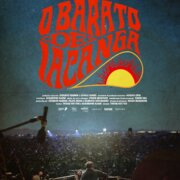Interviewed & Written by Sana Rizvi
It is surprising how Brazil's largest outdoor music festival's from the 1970s and 80s completely vanished from the country's collective memory. The most significant manifestation of Brazil's underground scene, the legendary 'Águas Claras' music festival, was Brazil's answer to Woodstock. Held when military law banned open-air events, the festival was one of the most important symbols of the counterculture movement in Brazil. But no one, not even Brazilian's knew about it- until now.
Thiago Mattar's debut feature film Taking Iacanga traces the history of the festival from its humble beginnings at organiser Leivinha's parent's farm to Joao Gilberto performing to a haze of over 100,000 hippies going through a massive catharsis.
As per Mattar, the memories of the Águas Claras were lost, even though it was a pioneering event in the history of Brazilian open-air music festivals. For Mattar who was 20 years old when he started research for his film, discovering the political and social impact the festival had during the military regime were a huge revelation. He committed himself to rescuing the story of a cultural struggle against middle-of-the-road, reactionary attitudes and a celebration of Brazil's musical diversity. For Mattar and his team, Taking Iacanga is their most significant contribution to Brazilian historiography and iconography. They dedicate the film to everyone who still believes in the revolutionary power of music!
WOMEX Film's Sana Rizvi, had a chance to chat with the young director about the work that went into reviving the memory of the festival, at a time when Brazil needs most to remember its past.
Thiago, how did you learn about the festival?
Thiago Mattar: About ten years ago, my father told me about the Águas Claras festival, that took place in his hometown, Iacanga. My father attended the festival in 1975 and 1981. When he told me about it and the experiences he had at the festival, I thought he was making up all this stuff. I for one had never heard about this "legendary" festival, and there was almost no information on the internet. So I decided to investigate this mysterious festival.
Why do you think the memories of this legendary festival are lost?
Thiago Mattar: Yes, the festival was forgotten and stayed that way for a long time. Maybe because the whole context in which it happened was too dark .The re-democratization of Brazil came in 1984, the year of the fourth and last Aguas Claras festival. So, after 1984, everything was considered past, almost like a trauma that we want to forget. And everyone forgot about the days of struggle fighting against the authoritarian regime. I think this is the primary reason for this memory loss. And, of course, Brazil has a memory problem. You can see how it reflected in our current political landscape. If our historical records were better preserved and widespread, I think we would be living a very different reality today. This is changing now. Or at least I hope it will with the help of this film. I'm trying to preserve an important part of our history with this movie.
Tell us more about what went into the research for the film and how you dug out all this incredible archive material that you used?
Thiago Mattar: It took me 10 long years of research and collecting information from many different sources including secret documents from the dictatorship period and others from the producers, musicians of the festival. But the primary source was the family behind the festival. They were all willing and full of stories to share. Some of them knew about some other sources that had archival footage and photos which also helped. Everyone pitched in to gather materials including my father who introduced me to Leivinha, the founder of the festival. .Even the scariest of characters, like the forensic photographer and his exalted defence of the military regime.
The film is a celebration of the diversity of music in Brazil, its heritage and cultures. Could you talk a bit about the relevance of a film like this in today's Brazil?
Thiago Mattar: It is almost impossible to make a film such as Taking Iacanga today- the Bolsonaro era has no sympathy for culture, art and artists. This government sees us as enemies of their historical revisionism and conservative policies. One of the terrible changes this year was the cut in many public investments in culture, mainly in cinema funds. My movie was only possible because of these funds that existed before the cuts were brought about. Also, now we have even institutionalised ideological censorship. The work of many filmmakers and artists is bound to disappear in the coming years of this government.
What are you listening to nowadays in terms of music and what's your next project going to be?
Thiago Mattar: Currently, I am listening to Brazilian country music and studying it as well. My new film project will look at how the economic capital influences the cultural capital and how this ends up reflecting on country music. I hope I can achieve what I am trying to do with the new film, and who knows, maybe I will be back at another edition of WOMEX!
Why should WOMEXicans watch the film?
Thiago Mattar: If you like Brazilian music and music festivals, this is the film for you. If you are curious to know how the festival founders got thousands of hippies to come to their farm and collectively listen to music during a Brazilian military dictatorship-Taking Iacanga has the answers for you.
For the month of January WOMEX Films on Demand shows three new films from Brazil - Bruno Murtinho's award winning Amazonia Groove , Ana Rieper's biopic film on Clementina de Jesus titled Clementina and Thiago Mattar's Taking Iacanga. Log into your virtualWOMEX account to watch the films.
article posted by:Sana Rizvi, Piranha Arts




